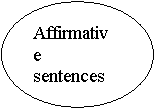Урок. Тема: "Шкільні предмети"
Class 6
Time:45 minutes
Topic: School Subjects
Lesson Objectives: to develop pupils' reading, speaking and listening skills; to activate the information and vocabulary on the topic; to develop pupils' communicative skills; to revise Present Simple tense; to teach pupils to work in pairs, groups and individually.
To develop pupils' curiosity and interest to the foreign language and have them understand the importance of having good command of English.
Materials and equipment: a tape-recorder, a cassette, book by A. Nesvit “English, sheets with puzzle, cards for work in pairs, groups and individually, stickers, evaluation sheets, pencils of green, yellow and red colours
Stages of the lesson.
I. Warming-up. (2 min.)
Lesson starts with listening to music “Sounds of nature” to make pupils' mood better. Pupils close their eyes and listen to music. Then pupils describe what they saw in their imagination while they were listening to music.
Introduction. (3 min.)
To guess the topic of the lesson pupils have to solve the puzzle.
s''  oo'
oo' 
s'  '
'  '''
''' 
 's
's
Teacher informs pupils about the objectives of the lesson. (Today we are going to speak about school subjects. By the end of the lesson you'll improve your skills in listening, speaking and reading and extend active and passive knowledge of vocabulary; use speech patterns in Present Simple tense. You should be able to speak about your timetable and your subjects at school.)
II. Main part. (35min.)
“Brainstorming” (2min.)
Teacher asks pupils to say what subjects they learn at school. Pupils name them.
World Literature English
![]()

![]() Music
Music

![]()
![]()
![]()
![]()
![]()
![]()
![]() Geography History
Geography History
Ukrainian
language
Mathematics


Ukrainian Computer Studies
Russian Art Physical Training
Ex.2 p.160 (2 min.) Pupils have to match pictures with the names of the school subjects in the box given below.
T. What is your favourite lesson? -Pupils' answers.
Game “What lesson is it?” (Work in groups) (3 min.) Class is divided into two teams. Teacher puts cards with the sentences on the table. Members of the teams go to the table in turn, take one of the cards and read the text which describes some actions at some lesson. The other pupils should guess what lesson it is. The team gets a point if it answers first. The winner is that team which has more points.
Pupils usually count and do sums at this lesson.
Pupils usually jump, run and do sport at this lesson.
Pupils usually speak, read and write English at this lesson.
Pupils usually learn how to operate the computer at this lesson.
Pupils usually read about different countries and continents, forests and mountains, seas and oceans at this lesson.
Pupils usually learn about the history of different countries at this lesson.
Game “Find the hidden words”. (3 min.) Teacher gives cards where the names of school subjects are hidden. Pupils have to find 9 names of school subjects and write them down into their copy-books.
|
h |
y |
m |
u |
s |
i |
c |
o |
l |
m |
n |
|
i |
h |
a |
n |
d |
i |
c |
r |
a |
f |
t |
|
s |
g |
e |
o |
g |
r |
a |
p |
h |
y |
w |
|
t |
s |
n |
b |
i |
o |
l |
o |
g |
y |
a |
|
o |
w |
g |
y |
m |
w |
r |
j |
r |
o |
r |
|
r |
t |
l |
v |
n |
a |
t |
k |
t |
g |
t |
|
y |
h |
i |
m |
a |
t |
h |
s |
z |
p |
l |
|
c |
j |
s |
w |
r |
u |
s |
s |
i |
a |
n |
|
l |
k |
h |
l |
b |
h |
u |
a |
f |
d |
v |
Then one of the pupils read aloud what words he/she has written down, the others help him/her.
Method “Carousel” (5 min.). Pupils have to find out what lessons their friends like best of all. Use the dialogues of ex.2 p.161.
Pupils in pairs ask each other about their favourite lessons and make notes. Then they change their partners and do this until they ask all classmates. After that they sum up the results of asking. One of pupils read them aloud. Ex.: 3 pupils like Mathematics because they like to count. 5 pupils like Art lessons because they are fond of drawing and painting pictures.
Minute of relaxation(1min.) Background music and pupils do some physical exercises.
Clap your hands together.
Stamp, stamp, stamp your feet,
Stamp your feet together.
Spin, spin, spin around,
Spin around together.
Shake, shake, shake your hands,
Shake your hands together.
Wink, wink, wink your eyes
Wink your eyes together.
Dance, dance, dance about,
Dance about together.
Smile, smile at your friends,
Let us smile together.
Reading. (ex.3p.161) (10min.)
- Pre-reading activity. Teacher asks pupils to answer some questios.
What is your favourite school day?
What lessons have you got that day?
- While-reading activity.
Teacher asks pupils to be ready to answer the following questions. What is Olia's favourite school day?
What day is difficult for Olia?
What is Olia's first (second, third, fourth) lesson? (Pupils have to write Olia's timetable for Friday down into their copy-books)
What are Olia's favourite lessons?
- Post-reading activity. Pupils work in pairs using ex.4 p.161. They have to say if the following sentences are true or false and correct them if they are false.
Work in groups. Class is divided into groups of 3-4 pupils. Their task is to make up the timetable for one day to be their favourite one. Background music may sound. Then representatives of each group represent their timetable
Revision of the Present Simple tense. (3min.) Mind map. Teacher asks pupils to answer some questions about the formation of the Present Simple tense, they answer them and help teacher to make up the mind m

![]()
![]()
![]() do does usually
do does usually
![]() sometimes
sometimes
![]()
![]()
![]()
![]()
![]()
![]()
![]()
![]()
![]()
![]()





often
general regular
in in
present present every day

![]()
![]()

Nouns (pl.) V1
Nouns (sing.) V1+s (es)
Nouns (pl.) do +not+V1
Nouns (sing.) does+not+V1
Role-play. (5min.) Work in pairs. Ex.5p.162. Pupils have to open the brackets and act out the dialogue.
III. Summing up. (5 minutes)
Evaluation. Teacher asks pupils to draw smiles on the stickers to show if they like or do not like the lesson. Then pupils go to the blackboard and stick them on it.
Teacher gives pupils evaluation sheets and they have to paint circles green, yellow or red opposite activities which were at the lesson. Green means, “Everything was clear at the lesson”. Yellow means, “It is difficult for me but I have done it.” Red means, “Help me! I don't understand material at all.”
Hometask. Pupils have to make up their own timetable for the whole week and write it down into copy-books.

про публікацію авторської розробки
Додати розробку
